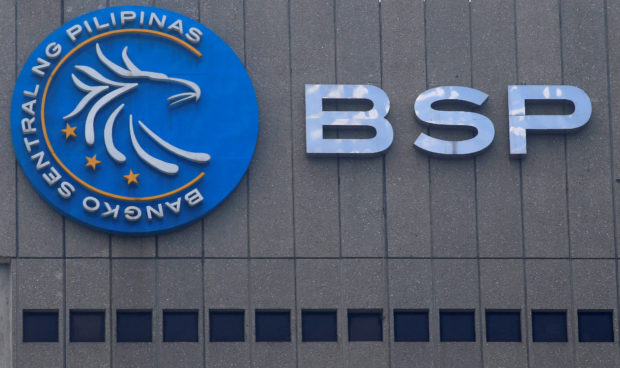
FILE PHOTO: A logo of Bangko Sentral ng Pilipinas (Central Bank of the Philippines) is seen at their main building in Manila, Philippines March 23, 2016. REUTERS/Romeo Ranoco
The Monetary Board is seen to maintain a “hawkish pause” when they meet on Thursday, Dec. 14, as central banks across the globe are set to keep interest rates high for longer than previously expected.
At the same time, upward pressure on prices of key commodities—especially food—prevail even if these have eased from recent peaks.
“We expect the Monetary Board of the Bangko Sentral Ng Pilipinas (BSP) to keep its policy rate unchanged at 6.5 percent at the upcoming meeting,” the research team at Goldman Sachs said, noting that this agrees with the common forecast.
“In recent comments [after] the CPI (consumer price index) inflation print, the Monetary Board reiterated that it will keep policy settings ‘sufficiently tight’ as it is currently too early to discuss easing monetary policy settings,” the global banking giant said.
The American group added that going forward, headline inflation is likely to briefly dip within BSP’s inflation target band of 2 percent to 4 percent in the first quarter of 2024 before increasing again in the second quarter.
“Given this dynamic, we continue to expect BSP to keep its policy rate unchanged until the third quarter next year,” Goldman Sachs added.
The United Kingdom-based Pantheon Macroeconomics thinks this will happen sooner or as early as February starting with a 0.25-percentage-point decrease.
Elevated core inflation
Robert Dan Roces, chief economist at Security Bank Corp., said that despite the easing headline inflation, core inflation remains elevated and above the headline level. Roces was referring to the growth rate of prices in key commodities and services, excluding those considered volatile such as food and energy.
“This implies that underlying inflationary pressures persist, requiring continued vigilance from the central bank,” he said. “The central bank may consider the government’s fiscal policy plans before making any decisions on interest rates.”
The United Nations-supervised Agricultural Markets Information System (Amis) said in their latest monthly report that while global commodity markets “have quieted down” and “even rice prices have fallen back from recent highs,” an ongoing fertilizer crisis is posing risks on prices and security of food supplies.
The Amis said that, despite a slowing global economy, demand for agricultural products remains strong and is expected to hit record levels in the 2023-24 marketing season.
At the Food and Agriculture Organization, the benchmark for world food commodity prices was observed to have been “broadly stable” in November. INQ